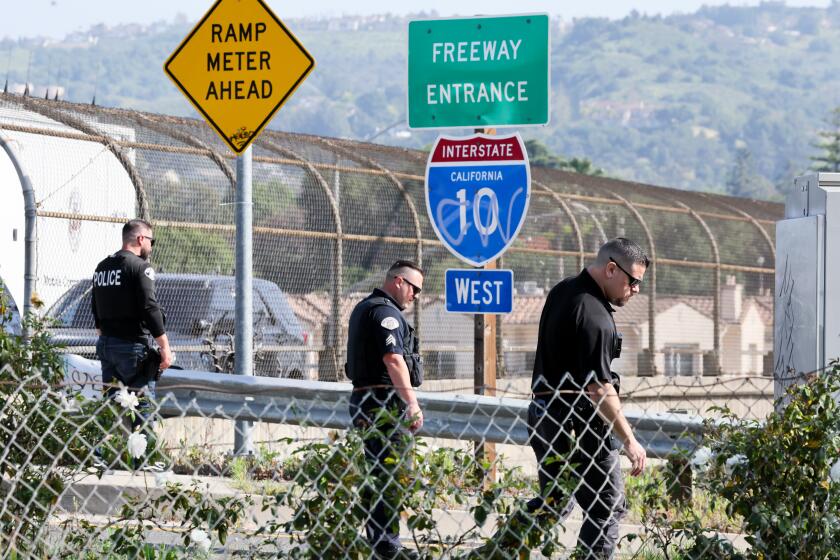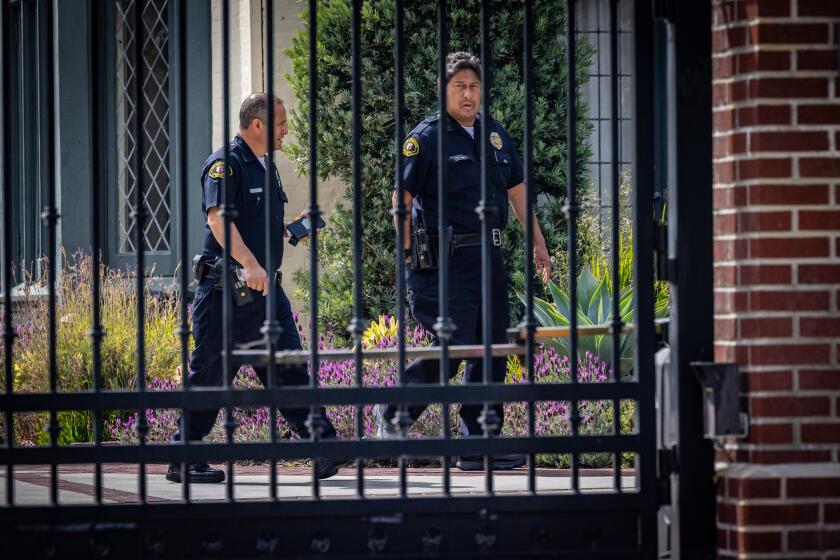All hands on board at ports
The threat of a crippling strike at the ports of Los Angeles and Long Beach lifted Thursday afternoon when both sides in the marathon labor contract negotiations gave ground that they had vowed to defend only a few hours earlier.
Representatives of the office clerical unit of Local 63 of the International Longshore and Warehouse Union and some of the world’s biggest oceangoing shipping lines and terminal operators shook hands at a Long Beach conference center on a tentative three-year deal. The union’s 930 members will vote on it by early next week, and they are expected to ratify it overwhelmingly.
A strike by Local 63 members alone would have amounted to a thinly stretched line of pickets that would hardly be noticeable among the constant movement of trucks, cranes and freight at the ports.
But the clerks are part of the 15,000-member ILWU, and ILWU officials had indicated that the 7,000 members who work at the ports would honor the clerks’ picket lines.
Rumors of an imminent strike that would have idled the nation’s busiest shipping complex were still flying Thursday morning when local President John Fageaux Jr. telephoned Stephen Berry, who represented the companies, and called for one more meeting, which began at noon.
Less than two hours later, the two most stubborn points of contention were finally resolved. The union agreed to the companies’ last offer on wages, and the companies backed off on a demand that they be allowed to bargain as a single unit in the next negotiations.
Fageaux and Berry said both sides were repeatedly forced to think about what a failure to agree could mean for the local and national economy.
Experts say the twin ports account for 40% of the nation’s cargo container traffic and for 12% of Southern California’s economic activity.
A strike that lasted for more than a couple of days would have forced port customers to divert cargo or ship by air at far higher cost.
One more reminder came for Fageaux early Wednesday afternoon, when he received an unexpected call from Los Angeles Mayor Antonio Villaraigosa, who urged the union to go back to the bargaining table for the sake of jobs and the local economy. Just hours earlier, both sides had declared an impasse after almost two months of negotiation.
The enormous consequences of failure were “a burden for both sides. The companies revised their last, best and final offer and we thought we should meet them halfway,” Fageaux said.
Berry put it differently, saying, “This is an agreement that will keep the ports open and the cargo flowing. It’s really a win-win-win for all sides.”
The deal offers clerks a 50-cent wage increase in the first year that brings their minimum hourly wage to $38. By the end of the third year, the wages go to $40 an hour. Berry said an 11% increase in pension benefits was also part of the agreement.
The sides agreed on a complicated deal for new pension and health and welfare trust funds that would cost $3.4 million and be jointly administered by the companies and the union.
The clerks will keep free healthcare and generous benefits that include up to six weeks of vacation. The union agreed to a series of quarterly meetings that could lead to the companies’ bargaining as a single unit.
The clerks process all the paperwork for every cargo ship entering and leaving the harbor. It’s a job that includes handling each ship’s bill of lading and informing customers of the price to ship cargo from its origin to its destination.
The job also requires a working knowledge of many federal regulations regarding cargo movement and frequent contact with various federal agencies such as the Food and Drug Administration, the Department of Agriculture, and Customs and Border Protection.
But for two clerks involved in the negotiations, nothing mattered more than working out an agreement that prevented their jobs from being outsourced to non-union labor.
“It’s all a matter of keeping what is ours. These days, anyone with a phone line and a laptop thinks that they can do our job. That was one of the biggest issues we were fighting for,” said Arnie Madrid, 35, a union member for nine years.
Clerk Peter Tan, 49, agreed. “We agree with improvements in technology, but jobs can slip right out from under you and into the hands of others if you are not careful,” he said.
Contract negotiations had begun in May but intensified after July 1, when the union’s last contract expired. Talks were held on 28 of the last 30 days and carried on for as long as 36 hours at a time without a break.
More to Read
Start your day right
Sign up for Essential California for news, features and recommendations from the L.A. Times and beyond in your inbox six days a week.
You may occasionally receive promotional content from the Los Angeles Times.







